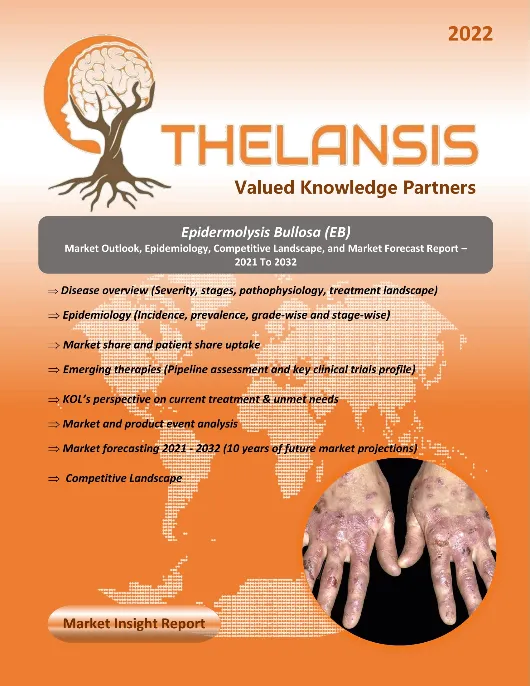Diabetic Peripheral Neuropathy (DPN) – Market Outlook, Epidemiology, Competitive Landscape, and Market Forecast Report – 2024 To 2034
- Published Date : November 25, 2024
- Updated On : August 13, 2025
- Pages : 152
Diabetic Peripheral Neuropathy (DPN) Market Outlook
Thelansis’s “Diabetic Peripheral Neuropathy (DPN) Market Outlook, Epidemiology, Competitive Landscape, and Market Forecast Report – 2024 To 2034” covers disease overview, epidemiology, drug utilization, prescription share analysis, competitive landscape, clinical practice, regulatory landscape, patient share, market uptake, market forecast, and key market insights under the potential Diabetic Peripheral Neuropathy treatment modalities options for eight major markets (USA, Germany, France, Italy, Spain, UK, Japan, and China).
Diabetic Peripheral Neuropathy (DPN) Overview
Diabetic peripheral neuropathy (DPN) is a common and chronic complication of diabetes, leading to distressing and expensive clinical issues such as foot ulcers, leg amputations, and neuropathic pain (painful DPN). This condition is linked to increased mortality and mainly results in diabetic foot ulcers and neuropathic pain. Typically, DPN is the most prevalent form of neuropathy in diabetes, affecting both sensory and motor nerves in a peripheral distribution. However, individuals’ impact on small and large sensory and motor fibers varies. DPN’s most significant risk factors are the duration of diabetes and glycemic control. Additional risk factors for cardiovascular disease, such as obesity, hypertension, smoking, and dyslipidemia, are also associated with DPN. The pathogenesis of DPN is complex and not fully understood. DPN risk is low at the diagnosis of type 1 diabetes, so foot screening should begin five years after diagnosis. Limited treatments are available to reverse the underlying nerve damage that causes DPN. Therefore, preventing DPN is a crucial aspect of diabetes care, and the American Diabetes Association (ADA) recommends achieving optimal glucose control in both type 1 and type 2 diabetes to prevent or slow the progression of DPN.
Geography coverage:
G8 (United States, EU5 [France, Germany, Italy, Spain, U.K.], Japan, and China)
Insights driven by robust research, including:
- In-depth interviews with leading KOLs and payers
- Physician surveys
- RWE analysis for claims and EHR datasets
- Secondary research (e.g., peer-reviewed journal articles, third-party research databases)
Deliverables format and updates*:
- Detailed Report (PDF)
- Market Forecast Model (MS Excel-based automated dashboard)
- Epidemiology (MS Excel; interactive tool)
- Executive Insights (PowerPoint presentation)
- Others: regular updates, customizations, consultant support
*As per Thelansis’s policy, we ensure that we include all the recent updates before releasing the report content and market model.
Salient features of Market Forecast model:
- 10-year market forecast (2024–2034)
- Bottom-up patient-based market forecasts validated through the top-down sales methodology
- Covers clinically and commercially-relevant patient populations/ line of therapies
- Annualized drug-level sales and patient share projections
- Utilizes our proprietary Epilansis and Analog tool (e.g., drug uptake and erosion) datasets and conjoint analysis approach
- Detailed methodology/sources & assumptions
- Graphical and tabular outputs
- Users can customize the model based on requirements
Key business questions answered:
- How can drug development and lifecycle management strategies be optimized across G8 markets (US, EU5, Japan, and China)?
- How large is the patient population in terms of incidence, prevalence, segments, and those receiving drug treatments?
- What is the 10-year market outlook for sales and patient share?
- Which events will have the greatest impact on the market’s trajectory?
- What insights do interviewed experts provide on current and emerging treatments?
- Which pipeline products show the most promise, and what is their potential for launch and future positioning?
- What are the key unmet needs and KOL expectations for target profiles?
- What key regulatory and payer requirements must be met to secure drug approval and favorable market access?
- and more…
Diabetic Peripheral Neuropathy (DPN) Market Outlook
Thelansis’s “Diabetic Peripheral Neuropathy (DPN) Market Outlook, Epidemiology, Competitive Landscape, and Market Forecast Report – 2024 To 2034” covers disease overview, epidemiology, drug utilization, prescription share analysis, competitive landscape, clinical practice, regulatory landscape, patient share, market uptake, market forecast, and key market insights under the potential Diabetic Peripheral Neuropathy treatment modalities options for eight major markets (USA, Germany, France, Italy, Spain, UK, Japan, and China).
Diabetic Peripheral Neuropathy (DPN) Overview
Diabetic peripheral neuropathy (DPN) is a common and chronic complication of diabetes, leading to distressing and expensive clinical issues such as foot ulcers, leg amputations, and neuropathic pain (painful DPN). This condition is linked to increased mortality and mainly results in diabetic foot ulcers and neuropathic pain. Typically, DPN is the most prevalent form of neuropathy in diabetes, affecting both sensory and motor nerves in a peripheral distribution. However, individuals’ impact on small and large sensory and motor fibers varies. DPN’s most significant risk factors are the duration of diabetes and glycemic control. Additional risk factors for cardiovascular disease, such as obesity, hypertension, smoking, and dyslipidemia, are also associated with DPN. The pathogenesis of DPN is complex and not fully understood. DPN risk is low at the diagnosis of type 1 diabetes, so foot screening should begin five years after diagnosis. Limited treatments are available to reverse the underlying nerve damage that causes DPN. Therefore, preventing DPN is a crucial aspect of diabetes care, and the American Diabetes Association (ADA) recommends achieving optimal glucose control in both type 1 and type 2 diabetes to prevent or slow the progression of DPN.
Geography coverage:
G8 (United States, EU5 [France, Germany, Italy, Spain, U.K.], Japan, and China)
Insights driven by robust research, including:
- In-depth interviews with leading KOLs and payers
- Physician surveys
- RWE analysis for claims and EHR datasets
- Secondary research (e.g., peer-reviewed journal articles, third-party research databases)
Deliverables format and updates*:
- Detailed Report (PDF)
- Market Forecast Model (MS Excel-based automated dashboard)
- Epidemiology (MS Excel; interactive tool)
- Executive Insights (PowerPoint presentation)
- Others: regular updates, customizations, consultant support
*As per Thelansis’s policy, we ensure that we include all the recent updates before releasing the report content and market model.
Salient features of Market Forecast model:
- 10-year market forecast (2024–2034)
- Bottom-up patient-based market forecasts validated through the top-down sales methodology
- Covers clinically and commercially-relevant patient populations/ line of therapies
- Annualized drug-level sales and patient share projections
- Utilizes our proprietary Epilansis and Analog tool (e.g., drug uptake and erosion) datasets and conjoint analysis approach
- Detailed methodology/sources & assumptions
- Graphical and tabular outputs
- Users can customize the model based on requirements
Key business questions answered:
- How can drug development and lifecycle management strategies be optimized across G8 markets (US, EU5, Japan, and China)?
- How large is the patient population in terms of incidence, prevalence, segments, and those receiving drug treatments?
- What is the 10-year market outlook for sales and patient share?
- Which events will have the greatest impact on the market’s trajectory?
- What insights do interviewed experts provide on current and emerging treatments?
- Which pipeline products show the most promise, and what is their potential for launch and future positioning?
- What are the key unmet needs and KOL expectations for target profiles?
- What key regulatory and payer requirements must be met to secure drug approval and favorable market access?
- and more…
1. Key Findings and Analyst Commentary
- Key trends: market snapshots, SWOT analysis, commercial benefits and risk, etc..
2. Disease Context
- Disease definition, classification, etiology and pathophysiology, drug targets,etc.
3. Epidemiology
- Key takeaways
- Incidence / Prevalence
- Diagnosed and Drug-Treated populations
- Comorbidities
- Other relevant patient segments
4. Market Size and Forecast
- Key takeaways
- Market drivers and constraints
- Drug-class specific trends
- Country-specific trends
5. Competitive Landscape
- Current therapies
- Key takeaways
- Dx and Tx journey/algorithm
- Key current therapies – profiles and KOL insights
- Emerging therapies
- Key takeaways
- Notable late-phase emerging therapies – profiles, launch expectations, KOL insights
- Notable early-phase pipeline
6. Unmet Need and TPP Analysis
- Top unmet needs and future attainment by emerging therapies
- TPP analysis and KOL expectations
7. Regulatory and Reimbursement Environments (by country and payer insights)
8. Appendix (e.g., bibliography, methodology)
Table of contents (TOC)
1. Key Findings and Analyst Commentary
- Key trends: market snapshots, SWOT analysis, commercial benefits and risk, etc..
2. Disease Context
- Disease definition, classification, etiology and pathophysiology, drug targets,etc.
3. Epidemiology
- Key takeaways
- Incidence / Prevalence
- Diagnosed and Drug-Treated populations
- Comorbidities
- Other relevant patient segments
4. Market Size and Forecast
- Key takeaways
- Market drivers and constraints
- Drug-class specific trends
- Country-specific trends
5. Competitive Landscape
- Current therapies
- Key takeaways
- Dx and Tx journey/algorithm
- Key current therapies – profiles and KOL insights
- Emerging therapies
- Key takeaways
- Notable late-phase emerging therapies – profiles, launch expectations, KOL insights
- Notable early-phase pipeline
6. Unmet Need and TPP Analysis
- Top unmet needs and future attainment by emerging therapies
- TPP analysis and KOL expectations
7. Regulatory and Reimbursement Environments (by country and payer insights)
8. Appendix (e.g., bibliography, methodology)


